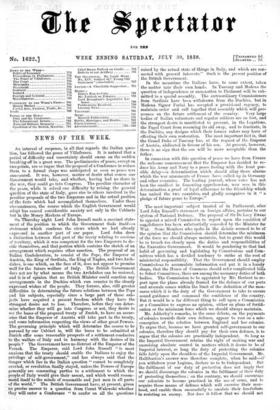NEWS OF THE WEEK.
An interval of suspense, in all that regards the Italian ques- tion, has followed the peace of Villafranea. It is natural that a period of difficulty and uncertainty should ensue on the sudden breaking off in a great war. The preliminaries of peace, except on two points, are so vague that the proposal of a Conference to reduce
theta to a formal shape was anticipated as soon as peace was anuogneect It was, however, matter of doubt what course our Government would take, and whether, having had no share in the war, they could go into Congress. The peculiar character of
the peaoe, while it solved one difficulty by raising the general question of the state of Italy, gave rise to others involved in the peculiar proposals of the two Emperors and in the actual position of the facts which had accomplished themselves. Under these circumstances, the course which the English Government would adopt has caused considerable anxiety not only in the Cabinets but in.lhe Money Markets of Europe. On 'Thursday night Lord John Russell made a succinct state- ment of the position in which the Government finds itself—a • statement which confirms the views which we had already expressed- in another part of our paper. Lord John drew a distinction between that part of the treaty relating to cessions of territory, which it was competent for the two Emperors to de- cide themselves and that portion which contains the sketch of an arrangement which requires other sanction. The proposal of an Italian Confederation, to consist of the Pope, the Emperor of Austria, the King of Sardinia, the King of Naples, and two Arch- dukes, is one which, on the face of it, does not appear to promise well for the future welfare of Italy. The British Government dots not see by what means the two Archdukes can be restored, and it is of opinion that no British Minister could sanction any arrangements in the Duchies which run counter to the clearly expressed wishes of the people. They foresee, also, still greater difficulties in determining the future relations between the Pope and his subjects, especially since a large part of those sub- jects have acquired a present freedom which they have the • strongest desire not to lose. Therefore, before they can deter- mine whether they will go into Congress or not, they desire to see the bases of the proposed treaty of Zurich, to have an assur- ance that the Emperor of Austria will take part in the treaty, and some information respeeting the views of other great Powers.
The governing principle which will determine the course to be pursued by our Cabinet is, will the bases to be submitted at Zurich offer some reasonable prospects of a settlement conducive
to the welfare of Italy and in harmony with the desires of its people ? The Government have no distrust of the Emperor of the French. The Emperor, said Lord John Russell "is most
anxious that the treaty should enable the Italians to enjoy the privilege of self-government," and has always said that the danger which lies in the Italitiii question "cannot be completely averted, or revolution finally stayed, unless the Powers of Europe generally are consenting parties to a settlement to which the people of Italy would give their assent, and which would recom- mend itself to the minds of reasonable and just men in all parts of the world." The British Government have, at present, given no precise answer to a question from Count Walewsld whether they will enter a Conference "to confer on all the questions raised by the actual state of things in Italy, and which are con- nected with general interests." Such is the present position of the British Government.
In the meantime the Italians have, to some extent, taken the matter into their own hands. In Tuscany and Modena the question of independence or annexation to Piedmont will be sub- mitted to a special assembly. The extraordinary Commissioners from Sardinia have been withdrawn from the Duchies, but in Modena Signor Farini has accepted a provisional regency, to maintain order and call together that assembly which will pro- nounce on the future settlement of the country. Very large bodies of Italian volunteers and regular soldiers are on foot, and the strongest desire is manifested to prevent, in the Legations, the Papal Court from resuming its old sway, and to frustrate, in the Duchies, any designs which their former rulers may have of effecting their own restoration. The most important fact is, that the Grand Duke of Tuscany has, at the request of the Emperor of Austria, abdicated in favour of his son. At present, however, there is no sign that the son will be more acceptable than the father.
In connexion with this question of peace we have from France
the welcome announcement that the Emperor has decided to re- duce his Army and Navy to a peace footing with the least pos- sible delay—a-determination which should allay those alarms whi-ch the war armaments of France have called up in Germany and ether countries. The leading journal, whose voice has not been the smallest in fomenting apprehension, now sees in this determination a proof of loyal adherence to the friendship which has united the two countries, and gladly recognizes in it " a pledge of future peace to Europe."


























